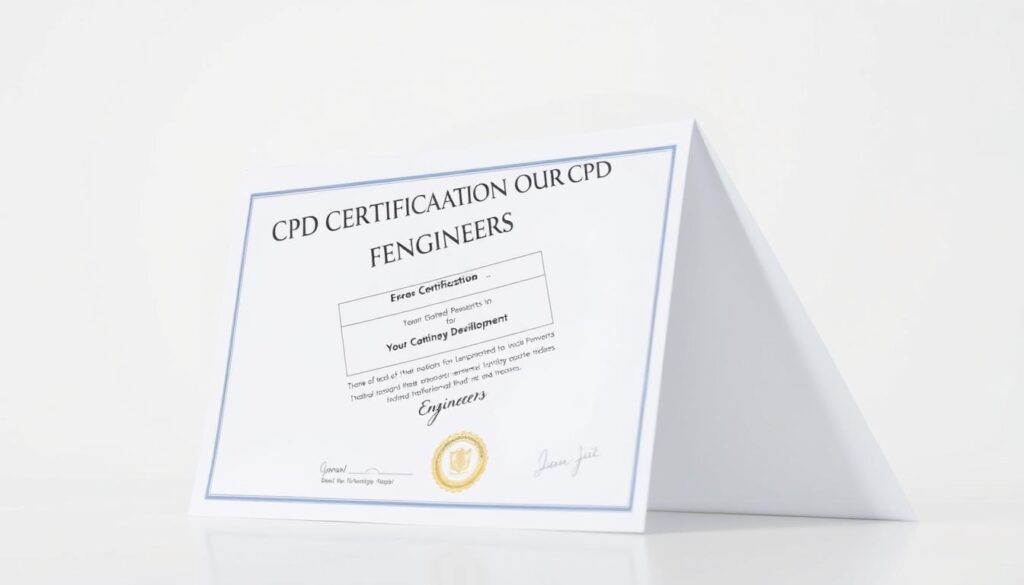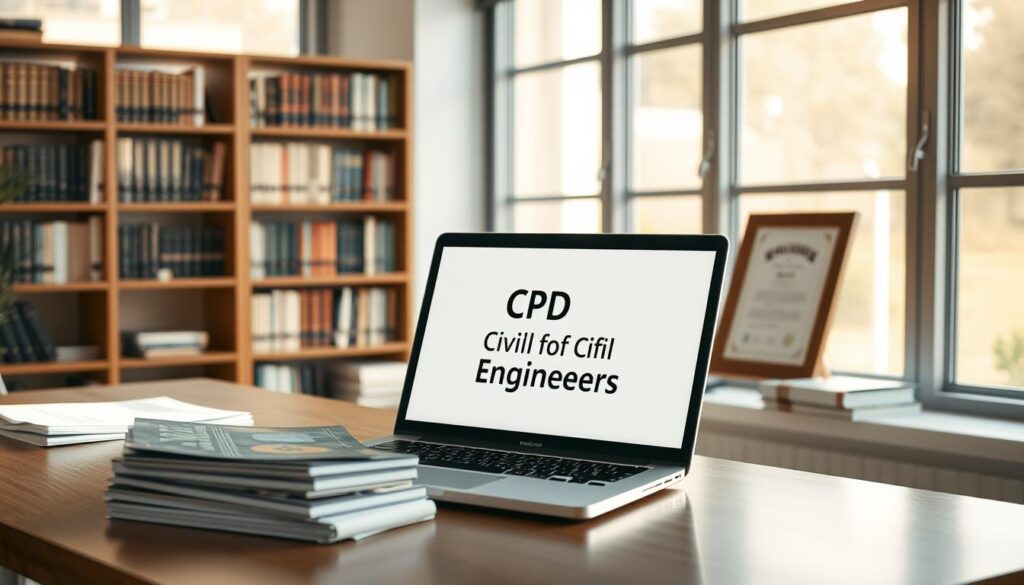Are Kenyan civil engineers equipped with the latest skills and knowledge to tackle the country’s infrastructure challenges?
The construction industry is constantly evolving, with new technologies and methodologies emerging regularly. For civil engineers in Kenya, staying updated is crucial to delivering projects that meet international standards.
Continuing Professional Development (CPD) plays a vital role in ensuring that engineers are equipped to handle complex projects and adapt to changing industry demands.
Key Takeaways
- Understanding the importance of CPD for civil engineers.
- Recognizing the role of CPD in staying updated with industry standards.
- Identifying the benefits of CPD for professional growth.
- Learning how CPD can enhance project delivery.
- Discovering the impact of CPD on the construction industry.
Understanding CPD: A Brief Overview
In the ever-evolving field of civil engineering, CPD plays a vital role in maintaining professional competence and enhancing skills. As the engineering landscape continues to advance, the need for ongoing education and training becomes increasingly important.
Definition of CPD
Continuing Professional Development (CPD) refers to the systematic process of maintaining and enhancing the knowledge, skills, and competencies of professionals throughout their careers. For civil engineers, CPD involves a range of activities designed to keep them abreast of the latest developments, technologies, and best practices in their field.
CPD is not just about attending courses or seminars; it’s a proactive approach to learning and professional growth, enabling engineers to stay current and competent in their profession.
Importance of CPD for Engineers
The importance of CPD for engineers cannot be overstated. It ensures that they remain competent and capable of delivering high-quality services. Through CPD, engineers can enhance their skills, expand their knowledge, and stay updated on industry standards and regulations.
Moreover, CPD is crucial for career advancement and for meeting the requirements set by professional bodies and regulatory authorities. It demonstrates a commitment to lifelong learning and professional excellence.
By engaging in CPD activities, civil engineers can not only improve their professional standing but also contribute to the overall development of the engineering community. It’s a key aspect of maintaining professional registration and ensuring that engineers are equipped to handle current and future challenges.
The Role of Engineers Board of Kenya
The Engineers Board of Kenya plays a pivotal role in regulating the engineering profession. As the primary regulatory body, it oversees the practice of engineering in the country, ensuring that engineers adhere to the required standards and guidelines.
Overview of Engineers Board of Kenya
The Engineers Board of Kenya is responsible for licensing engineers, regulating their professional conduct, and promoting the development of the engineering profession. It achieves these objectives through various initiatives, including setting standards for engineering education and practice.

Regulations Governing CPD
The Engineers Board of Kenya has established specific regulations governing Continuing Professional Development (CPD) for engineers. These regulations mandate that engineers undertake a certain number of CPD hours to maintain their licensure and stay updated with the latest developments in their field.
The CPD requirements are designed to ensure that engineers continue to enhance their skills and knowledge, thereby maintaining the highest standards of professional practice. The regulations specify the types of activities that qualify as CPD, such as workshops, seminars, and conferences.
| CPD Activity Type | Description | Typical Duration |
|---|---|---|
| Workshops | Practical training sessions on specific engineering topics | 1-3 days |
| Seminars | Presentations on current issues and advancements | Half-day to 1 day |
| Conferences | Large gatherings featuring multiple presentations and discussions | 2-5 days |
By regulating CPD, the Engineers Board of Kenya ensures that engineers in Kenya remain competent and competitive, both locally and internationally.
CPD Requirements for Civil Engineers in Kenya
To remain registered and active, civil engineers in Kenya are required to complete a certain number of CPD hours as mandated by the Engineers Board of Kenya. This requirement ensures that civil engineers stay competent and updated with the latest industry practices.
Minimum CPD Hours Required
The Engineers Board of Kenya has specified that civil engineers must complete a minimum of 30 CPD hours within a 2-year cycle. This can be achieved through various CPD activities that are relevant to their field of practice.
Types of Acceptable CPD Activities
CPD activities for civil engineers in Kenya can include a range of professional development opportunities. Some of the acceptable activities are:
- Formal education courses related to civil engineering
- Workshops and seminars on topics relevant to civil engineering
- Conferences and webinars that focus on advancements in civil engineering
- Technical visits and inspections that enhance practical knowledge
Here is a summary of the CPD requirements and acceptable activities in a tabular format:
| Category | Description | CPD Hours |
|---|---|---|
| Formal Education | Courses related to civil engineering | Up to 15 hours |
| Workshops and Seminars | Events on topics relevant to civil engineering | Up to 10 hours |
| Conferences and Webinars | Events focusing on advancements in civil engineering | Up to 10 hours |
| Technical Visits | Inspections that enhance practical knowledge | Up to 5 hours |
It’s essential for civil engineers to choose CPD activities that align with their professional goals and areas of specialization. By doing so, they can ensure that their CPD hours are relevant and beneficial to their career development.
Categories of CPD Activities
CPD certification for engineers is achieved through a range of activities that cater to different learning needs and preferences. The Engineers Board of Kenya has outlined several categories of CPD activities that civil engineers can engage in to meet their professional development requirements.
Professional Development Courses
Professional development courses are structured learning programs designed to enhance the skills and knowledge of civil engineers. These courses cover a wide range of topics, from technical skills to management and leadership. For instance, a course on advanced structural analysis can help engineers stay updated on the latest design methodologies and software.
Key features of professional development courses include:
- Structured learning objectives
- Expert instructors
- Opportunities for hands-on practice
Workshops and Seminars
Workshops and seminars offer interactive learning experiences where civil engineers can engage with industry experts and peers. These events are often focused on specific topics or emerging trends in the field. For example, a seminar on sustainable construction practices can provide insights into eco-friendly building materials and techniques.
The benefits of attending workshops and seminars include:
- Gaining practical knowledge
- Networking opportunities
- Staying updated on industry trends
Conferences and Webinars
Conferences and webinars are valuable platforms for civil engineers to learn about the latest developments in their field. These events feature presentations from renowned experts and offer opportunities for Q&A and discussion. A webinar on innovative bridge design can showcase cutting-edge technologies and methodologies.
“The future of civil engineering lies in embracing new technologies and sustainable practices. Conferences and webinars play a crucial role in disseminating this knowledge.” –

By participating in these categories of CPD activities, civil engineers in Kenya can ensure they remain competent and competitive in their profession, ultimately contributing to the advancement of the engineering field.
Benefits of CPD for Civil Engineers
For civil engineers, maintaining CPD is not just a requirement but a pathway to enhancing their professional capabilities. By engaging in CPD activities, civil engineers can stay abreast of the latest developments in their field, improve their skills, and expand their professional networks.
Enhancing Skills and Knowledge
One of the primary benefits of CPD is the enhancement of skills and knowledge. Civil engineers can participate in various training programs, workshops, and seminars that focus on the latest technologies and methodologies. For instance, courses on sustainable building practices or advanced structural analysis can significantly improve their competence.
Key areas where CPD enhances skills include:
- Technical skills related to design and construction
- Project management and leadership abilities
- Understanding of new regulations and standards
Networking Opportunities
CPD events provide civil engineers with valuable opportunities to network with peers and industry leaders. These interactions can lead to the exchange of ideas, collaboration on projects, and access to new career opportunities.
“Networking is not about connecting people. It’s about connecting people with people, people with opportunities, and people with ideas.” – Michele Jennae
By attending conferences, seminars, and workshops, civil engineers can expand their professional networks, gaining insights into best practices and innovative solutions.
Career Advancement
Engaging in CPD can significantly contribute to career advancement. By enhancing their skills and knowledge, civil engineers become more competitive in the job market. Moreover, CPD demonstrates a commitment to professional development, which is highly regarded by employers.
| CPD Activity | Career Benefit |
|---|---|
| Professional development courses | Enhanced technical skills and knowledge |
| Workshops and seminars | Networking opportunities and exposure to new ideas |
| Conferences and webinars | Access to industry leaders and latest trends |
As illustrated in the table, various CPD activities offer distinct career benefits, from skill enhancement to networking and staying updated on industry trends.
In conclusion, CPD is essential for the long-term success of civil engineers. By enhancing their skills and knowledge, providing networking opportunities, and contributing to career advancement, CPD supports their professional growth and adaptability in a rapidly changing industry.
Aligning CPD with Professional Goals
Aligning Continuing Professional Development (CPD) with career objectives is crucial for civil engineers to stay competitive in their field. By focusing on relevant development activities, engineers can enhance their skills and knowledge, ultimately advancing their careers.
To effectively align CPD with professional goals, civil engineers must first identify their personal development objectives. This involves assessing their current skills, understanding the requirements of their desired career path, and determining the gaps that need to be addressed.
Setting Personal Development Objectives
Setting clear and achievable personal development objectives is the foundation of a successful CPD strategy. Civil engineers should consider their short-term and long-term career aspirations when setting these objectives. For instance, an engineer aiming to move into a management role may focus on developing leadership and project management skills.
Key considerations when setting personal development objectives include:
- Assessing current competencies and identifying areas for improvement
- Understanding the skills and knowledge required for career advancement
- Setting specific, measurable, achievable, relevant, and time-bound (SMART) goals
Identifying Relevant CPD Opportunities
Once personal development objectives are set, the next step is to identify relevant CPD opportunities that align with these goals. This could include professional development courses, workshops, seminars, conferences, and webinars.
When selecting CPD activities, civil engineers should consider the following factors:
| Factor | Description |
|---|---|
| Relevance | How closely does the CPD activity align with your personal development objectives? |
| Quality | Is the CPD activity provided by a reputable organization? |
| Accessibility | Is the CPD activity accessible in terms of timing, location, and cost? |
By carefully aligning CPD activities with professional goals, civil engineers can maximize their professional development and stay competitive in the ever-evolving field of civil engineering.

How to Document CPD Activities
Documenting CPD activities is a crucial step for civil engineers in Kenya to comply with the Engineers Board of Kenya’s regulations. Effective documentation not only helps in maintaining a record of professional development but also demonstrates a commitment to ongoing learning and professional growth.
Record-Keeping Best Practices
To ensure compliance with the Kenya engineering CPD guidelines, civil engineers should adopt best practices for record-keeping. This includes maintaining detailed records of all CPD activities, such as workshops, seminars, conferences, and webinars. The records should include the date, duration, and a brief description of the activity, as well as the provider’s name and any certificates issued.
Key elements to record:
- Date and duration of the CPD activity
- Description of the activity and its relevance to professional development
- Name and credentials of the CPD provider
- Certificates or proof of attendance
Importance of Maintaining Records
Maintaining accurate and comprehensive records of CPD activities is essential for several reasons. Firstly, it ensures compliance with the Engineers Board of Kenya’s regulations, reducing the risk of non-compliance. Secondly, it provides a clear picture of professional development over time, helping engineers to identify areas for further improvement and plan their future CPD activities effectively.
By keeping detailed records, civil engineers in Kenya can demonstrate their commitment to ongoing professional development and stay up-to-date with the latest industry practices and technologies.
Common Challenges in Meeting CPD Requirements
CPD is crucial for the professional growth of civil engineers in Kenya, yet they encounter numerous challenges in fulfilling these requirements. The Engineers Board of Kenya has set stringent CPD requirements to ensure that civil engineers stay updated with the latest technologies and practices.
Despite the importance of CPD, civil engineers face several obstacles. Two significant challenges are time management issues and accessing quality CPD programs.
Time Management Issues
Managing time effectively is a significant challenge for many civil engineers. With demanding work schedules and multiple commitments, finding time for CPD activities can be difficult.
To overcome time management issues, civil engineers can:
- Prioritize their tasks and allocate specific times for CPD activities.
- Utilize online CPD programs that offer flexibility in terms of timing.
- Combine CPD activities with other professional obligations, such as attending conferences that count towards CPD hours.
Accessing Quality CPD Programs
Another challenge is accessing CPD programs that are relevant, high-quality, and recognized by the Engineers Board of Kenya. The quality of CPD programs can vary significantly, and not all programs may be relevant to the specific needs of civil engineers.
To address this, civil engineers can:
- Research thoroughly to identify CPD programs that are accredited and well-regarded in their field.
- Seek recommendations from peers and professional associations.
- Evaluate the content and delivery method of the CPD program to ensure it meets their needs.
Here is a summary of the common challenges and potential solutions in a tabular format:
| Challenge | Potential Solutions |
|---|---|
| Time Management Issues | Prioritize tasks, utilize online CPD programs, combine CPD with other professional obligations |
| Accessing Quality CPD Programs | Research accredited programs, seek peer recommendations, evaluate program content and delivery |

By understanding these challenges and implementing effective strategies, civil engineers in Kenya can successfully meet their CPD requirements and continue to grow professionally.
Online Resources for CPD in Kenya
Kenyan civil engineers can leverage online resources to meet their CPD needs efficiently. The digital landscape offers a plethora of opportunities for professional development, making it easier to comply with the engineering CPD regulations Kenya has set forth.
With numerous online platforms available, civil engineers can choose the resources that best fit their schedules and learning preferences. This flexibility is crucial in managing the demands of professional life while accumulating CPD points for civil engineers.
Recommended Websites
Several websites offer valuable resources for civil engineers looking to enhance their skills and knowledge. Some of the recommended websites include:
- Engineers Board of Kenya: The official website provides updates on CPD requirements, upcoming events, and relevant resources.
- Kenya Institution of Engineers: Offers webinars, workshops, and other CPD opportunities.
- International websites such as the Institution of Civil Engineers (ICE) and the American Society of Civil Engineers (ASCE) also provide high-quality CPD resources.
Online Training Platforms
Online training platforms have become indispensable for CPD. They offer a range of courses and training programs tailored to the needs of civil engineers. Some popular platforms include:
- Coursera: Partners with top universities to offer courses relevant to civil engineering.
- Udemy: Provides a wide range of courses, from basic to advanced levels, on various civil engineering topics.
- edX: Offers professional certificate programs and courses from leading institutions.
These platforms not only provide flexibility but also allow civil engineers to learn at their own pace, making it easier to balance work and professional development.
By utilizing these online resources, Kenyan civil engineers can efficiently meet their CPD requirements, stay updated with the latest industry practices, and enhance their professional skills.
Importance of CPD in a Global Context
As the world becomes increasingly interconnected, the role of CPD in supporting the global mobility of engineers has gained significant attention. The ability of engineers to work across borders is heavily influenced by their ability to meet international standards and practices, which CPD helps to facilitate.
CPD is not just a local requirement; it’s a global necessity. Engineers worldwide are expected to adhere to high standards of professional development, and CPD courses for civil engineers play a crucial role in this endeavor. By engaging in CPD activities, engineers can ensure that their skills and knowledge are up-to-date and aligned with global best practices.
Comparative CPD Requirements Globally
Different countries have varying requirements for CPD, reflecting local regulations, industry needs, and professional standards. For instance, in the United Kingdom, engineers are expected to complete a certain number of CPD hours annually to maintain their professional registration. Similarly, in Australia, engineers must adhere to a CPD plan that is reviewed regularly.
| Country | CPD Requirements | Certification Body |
|---|---|---|
| United Kingdom | Minimum of 35 hours per year | Engineering Council |
| Australia | Regular CPD plan review | Engineers Australia |
| United States | Varies by state and profession | NCEES |
The table above illustrates the diversity in CPD requirements across different countries, highlighting the need for engineers to be aware of the specific requirements in their region or the region they wish to work in.
Global Standards and Practices
Despite the variations in CPD requirements, there is a growing trend towards adopting global standards and practices in professional development. This is driven by the increasing mobility of engineers and the need for consistency in professional standards across borders.
“The global engineering community is moving towards a more harmonized approach to CPD, recognizing the value of a standardized framework for professional development.”
CPD certification for engineers is becoming more recognized globally, facilitating the international mobility of professionals. By adhering to global standards and practices, engineers can ensure that their CPD activities are relevant and recognized worldwide.

In conclusion, CPD plays a vital role in the global engineering community, supporting the development of professionals who can work effectively across different countries and contexts. By understanding and adhering to global standards and practices, engineers can enhance their career prospects and contribute to the advancement of the profession worldwide.
Future Trends in Civil Engineering CPD
Civil engineering CPD is evolving rapidly, driven by technological innovations and changing professional needs. As we look to the future, it’s clear that the way civil engineers develop their skills and knowledge will be significantly different from today’s practices.
Innovations in CPD Delivery
The delivery of CPD is becoming more diverse, with a range of new methods and platforms emerging. Some of the key innovations include:
- Online and blended learning programs that offer flexibility and accessibility.
- Virtual and augmented reality training, which provides immersive learning experiences.
- Microlearning opportunities, such as short courses and webinars, that cater to busy professionals.
These innovations are making it easier for civil engineers to meet their CPD requirements, regardless of their location or schedule.
The Role of Technology in CPD
Technology is playing an increasingly important role in CPD, enabling more effective and efficient learning. Some of the key technologies being used include:
| Technology | Application in CPD |
|---|---|
| Online Learning Platforms | Hosting courses, webinars, and other learning resources. |
| Virtual Reality (VR) | Providing immersive training experiences for complex engineering tasks. |
| Artificial Intelligence (AI) | Personalizing learning paths and assessing learner progress. |
By leveraging these technologies, civil engineers can stay up-to-date with the latest developments in their field and enhance their professional capabilities.
As the field continues to evolve, it’s likely that we’ll see even more innovative approaches to CPD, further supporting the ongoing development of civil engineers.
Tips for Effective CPD Management
Effective Continuing Professional Development (CPD) is crucial for civil engineers to stay updated with the latest industry trends and regulatory requirements in Kenya. By adopting a structured approach to CPD, civil engineers can ensure they meet the Engineers Board of Kenya’s requirements and enhance their professional skills.

Creating a CPD Plan
Creating a CPD plan is the first step towards effective CPD management. This involves setting clear professional development objectives that align with the Kenya engineering CPD guidelines. A well-structured CPD plan helps civil engineers identify relevant CPD opportunities, ensuring they make the most of their time and resources.
To create an effective CPD plan, civil engineers should start by assessing their current skills and knowledge gaps. They should then identify the CPD activities that will help them bridge these gaps, such as professional development courses, workshops, and seminars. It’s also essential to establish a timeline for completing these activities and to regularly review progress.
Engaging in Peer Learning
Engaging in peer learning is another critical aspect of effective CPD management. Peer learning involves sharing knowledge and experiences with colleagues and learning from their experiences. This can be achieved through various means, including participating in professional networks and forums, attending conferences and webinars, and collaborating on projects.
By engaging in peer learning, civil engineers can gain new insights and perspectives, enhance their skills, and stay updated with industry best practices. Moreover, peer learning fosters a culture of continuous improvement and collaboration within the engineering community in Kenya.
In conclusion, effective CPD management is vital for civil engineers in Kenya to meet the CPD requirements for civil engineers in Kenya and advance their careers. By creating a CPD plan and engaging in peer learning, civil engineers can ensure they stay competitive and compliant with regulatory requirements.
Collaborating with Professional Associations
Collaborating with professional associations is a vital aspect of continuing professional development (CPD) for civil engineers in Kenya. These organizations provide a platform for engineers to enhance their skills, network with peers, and stay updated on industry best practices.
Benefits of Joining a Professional Group
Joining a professional association offers numerous benefits, including access to CPD opportunities, networking events, and industry publications. Members can participate in conferences, seminars, and workshops that are crucial for accumulating CPD points for civil engineers.
- Opportunities for professional growth and development
- Access to industry-specific knowledge and resources
- Networking opportunities with peers and industry leaders
- Enhanced credibility and professional reputation
As emphasized by industry experts, “Professional associations play a pivotal role in the ongoing development of civil engineers, providing them with the necessary tools and knowledge to excel in their careers.”
“The future of civil engineering depends on the continuous learning and adaptation of its professionals. Professional associations are at the forefront of facilitating this growth.”
Key Associations for Civil Engineers in Kenya
Some of the key professional associations for civil engineers in Kenya include the Engineers Board of Kenya and the Institution of Engineers of Kenya. These organizations are instrumental in promoting continuing professional development for civil engineers through various initiatives and programs.
These associations not only provide CPD opportunities but also advocate for the interests of civil engineers, contributing to the overall development of the profession in Kenya.
Evaluating CPD Activities and Impact
Evaluating the effectiveness of Continuing Professional Development (CPD) activities is crucial for civil engineers in Kenya to stay updated with the latest engineering CPD regulations Kenya. This process ensures that CPD programs are meeting their intended objectives and contributing to the professional growth of civil engineers.

Assessing the Value of CPD Programs
To assess the value of CPD programs, it’s essential to establish clear criteria that align with the professional development needs of civil engineers. This includes evaluating the relevance, quality, and impact of the CPD activities on their work. By doing so, civil engineers can ensure that the CPD courses they undertake are beneficial and enhance their skills and knowledge.
The assessment process should involve gathering feedback from participants, evaluating the content and delivery of the CPD programs, and measuring the outcomes against predefined objectives. This comprehensive approach helps in identifying areas of improvement and ensuring that CPD activities remain relevant and effective.
Gathering Feedback and Making Adjustments
Gathering feedback is a critical component of evaluating CPD activities. It provides insights into the strengths and weaknesses of the programs and helps in identifying areas for improvement. Civil engineers can participate in CPD courses for civil engineers that are designed based on feedback, making them more effective and relevant to their needs.
By continuously gathering feedback and making adjustments, CPD providers can enhance the quality and impact of their programs. This iterative process ensures that CPD activities remain aligned with the evolving needs of civil engineers and contribute to their ongoing professional development.
Conclusion: Embracing Lifelong Learning in Engineering
The engineering profession is constantly evolving, with new technologies and methodologies emerging regularly. For civil engineers in Kenya, staying updated through Continuing Professional Development (CPD) is crucial for maintaining CPD for civil engineers and achieving CPD certification for engineers.
Embracing lifelong learning is essential for the ongoing development of civil engineers, enabling them to enhance their skills and knowledge in line with civil engineering professional development. By adhering to Kenya engineering CPD guidelines, engineers can ensure they remain competent and competitive in a rapidly changing world.
Continuous Improvement in Practice
Continuous improvement is at the heart of CPD, allowing civil engineers to refine their practices and adapt to new challenges. By engaging in relevant CPD activities, engineers can address emerging issues and capitalize on new opportunities.
Shaping the Future of CPD
As the engineering landscape continues to evolve, the future of CPD will be shaped by innovations in delivery methods and technologies. Staying abreast of these developments will be key to maximizing the benefits of CPD for civil engineers in Kenya and beyond.
